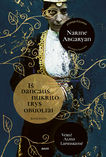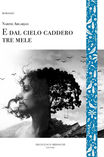Three Apples Fell from the Sky
Author
Over 300,000 copies sold worldwide
Full English & French translations available
Marquez’s all-time classic epic One Hundred Years of Solitude meets Sergei Parajanov’s Shadows of Forgotten Ancestors in this unforgettable fable about a small, decaying Armenian village perched atop Mount Manish Kar.
The title of the novel – Three Apples Fell from the Sky – refers to a typical ending of Armenian fairy-tales: “three apples fell from the sky: an apple for the one who watched, another for the one who told the story, and the third one for the one who listened.” The novel, too, resembles a fable. Its heroes are several families living in a decaying mountain village. The village’s only connections with the lowland are an old wire telegraph and a hardly visible road that even cows thread with difficulty. Part weirdoes, part naggers, the village’s few remaining inhabitants – a dozen of elderly people – share one thing in common: they believe in magic.
Love and pain, vengeance and forgiveness, friendship and feud tensely knot the lives of the villagers
together through generations. There’s Anatolia, the last of the village’s oldest family, having survived
a great famine. A rare beauty and a book lover, Anatolia suffered from the ravages of her husband’s
attacks, who fl ed the village after nearly beating her to death. There’s Vasily, a blacksmith and widower,
who lost his three sons and a younger brother in WWII. The same younger brother saved the village
from imminent destruction in a landslide, thanks to a unique foreseeing gift. There’s Yasaman, a healer and Anatolia’s friend and neighbor, who treats all villagers with self-prepared herb mixtures. There’s even a white peacock, whose miraculous appearance in the village during the famine is only explained at the novel’s end.
Readers follow the mundane routine of the old people’s lives — making baklava, baking cakes, gathering crops, doing house chores — and become familiar with their life stories, weaving into a slow-paced yet fascinating fable of a village facing an imminent ending. When one true miracle changes everything — 58-year-old Anatolia discovers that she is pregnant…
Narine Abgaryan brilliantly captures the oddness of local life, its striking beauty, and an underlying melancholy. With sumptuous visual imagery and a close eye for petty local details, Abgaryan paints
a world where a reader wishes to linger long after the story ends.
A magical realist story of friendship and feuds.
– The Guardian
Abgaryan impresses with finely phrased descriptions of daily activities and homes with “chimneys that clung to the hem of the sky,” and indelible details of complex, humble characters. This magical tale transcends familiar mystical tropes with its fresh reimagining of Armenian folklore.
— Publishers Weekly
A charming novel... [It] teems with minor characters whose quirks are at times amusing and at times heartbreaking... A warm-hearted story about family, friendship, and community.
— Foreword Reviews
Abgaryan’s folktale [is] so improbably of the moment... [her] leisurely, painstaking prose – in Hayden’s lyrical translation – is an added gift for readers at the moment, because it prompts us to adjust to the “measured pace of existence” that is now also our own.
— Asymptote Journal
A superb novel... I urge you to read it.
— Ma Lecturothèque (France)
Abgaryan’s work conveys a deep belief in the resilience of humanity without glossing over the horrors of human conflict.
A poignant, bittersweet, fable-like story... The strongest message that shines through this finely translated novel is that resignation need not lead to cynicism.
— Asian Review of Books
I loved this! A tender and quirky tale of stoicism, resilience and love... The ultimate feel-good story of an unlikely romance and the warmth of a community, drawn with humour, empathy and an earthy, magical charm.
— Mary Chamberlain, author of The Hidden
At the charming heart of Three Apples Fell from the Sky, pulses the certain knowledge that “it takes a village” – a village to bleed, to weep, and, finally, to laugh and celebrate as one.
— Faith Sullivan, author of The Cape Ann and Goodnight, Mr. Wodehouse
Abgaryan’s descriptions are beautifully written... I couldn’t put this book down.
— Un Univers de Livres blog (France)
A quiet song of a novel. A novel that opens and lingers... that sweeps over you like a wave on a beach.
— The Book Trail
A perfect book for anyone who wants to learn more about Armenia: its customs, its beliefs, traditions and history... A heartfelt, delicate novel.
— La Couleur des Mots blog (France)
A novel about ordinary life, written with extraordinary sensitivity and tenderness.
— Prestaplume (France)
A magical novel. It manages to be life-affirming without descending into cheap sentimentality... Abgaryan achieves this challenging balance in part through the beauty of the novel’s prose, which mimics the oral storytelling of myths and legends.
— End of the Word blogspot
To render the richness of Maran’s culture, translator Lisa C. Hayden confidently navigates the linguistic complexities of this book... Her translation is visual and sensory... Dramatic and humorous.
— The Common
Abgaryan’s affectionate portrayal of rural rhythms and unlikely romance is an absolute joy.
— New European – 30 Great European Books for the Beach
Book details
AST
Novel, 2016
315 pp
Rights sold
World English Oneworld Publications
French Macha Publishing
German Ullstein List
Italian Einaudi (1st ed Brioschi)
Estonian Tänapäev
Ukrainian PM Publishing
Bulgarian Labirint
Arabic AS Publishers
Armenian Newmag Publishing
Hungarian Typotex
Latvian Janis Roze
Malayalam (India) Green Books
Czech Prostor
Lithuanian Balto
Romanian Humanitas
Slovakian Artforum
Serbian Vulkan
Catalan Comanegra
Macedonian Muza
Simplified Chinese Rentian Ulus Cultural Media
Korean Eulyoo Publishing
Spanish Editorial Navona
Polish Krzysztof Głowinkowski/Glowbooks
Swedish Tranan
Croatian Hena
Turkish Hippo /Aras Ya
Portuguese Presenca
Sinhala (China) Subhavi
Thai Library House
Amharic Ethiopia Hohe Publishing
Theater rights sold
Literary awards
Winner of the Yasnaya Polyana Prize 2016
Nominated for the National Bestseller Prize 2016

























